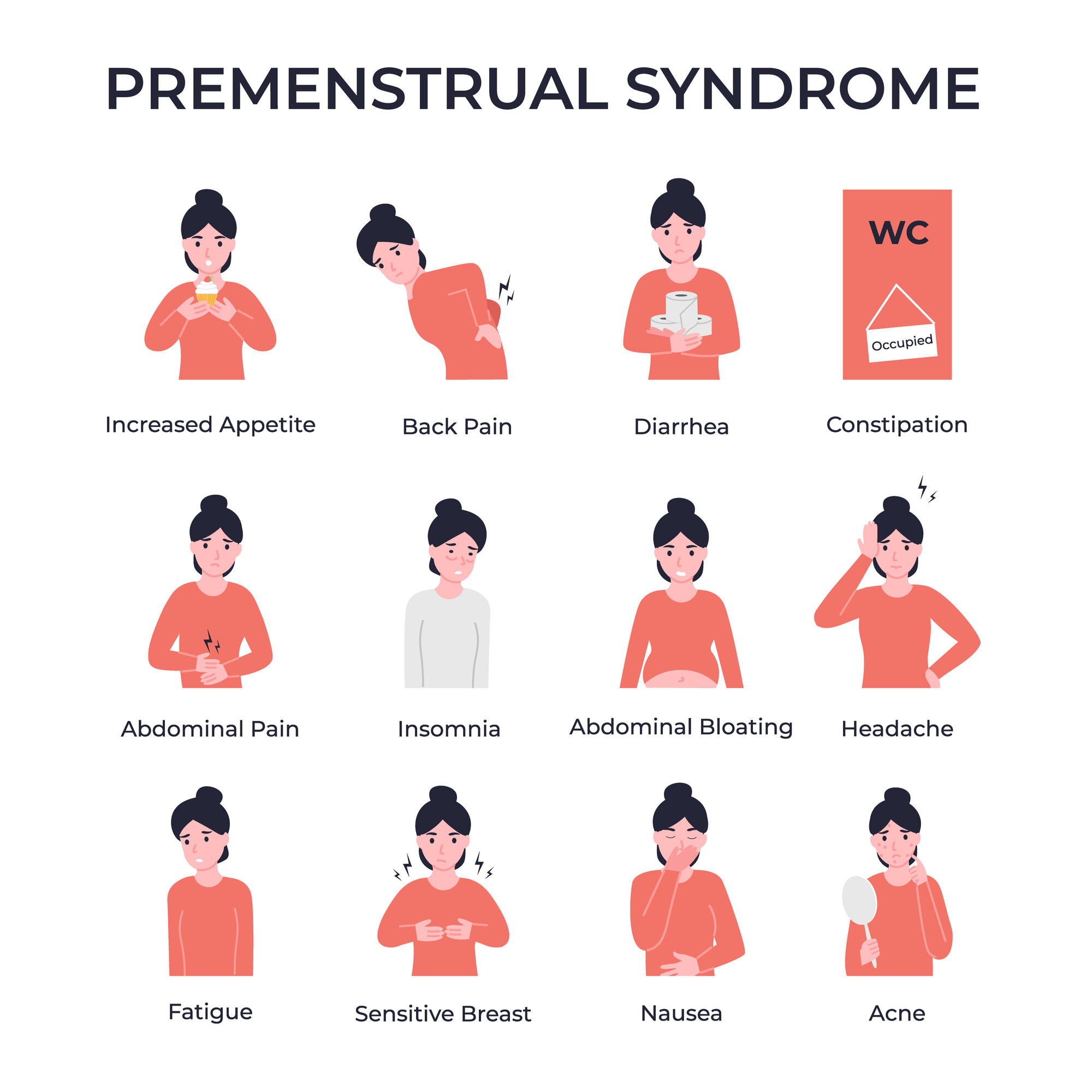Weight Gain During Period
Weight gain during period – is it normal? Gaining weight during your period is a normal occurrence for most women. There are many unwanted, but totally normal symptoms associated with Premenstrual Syndrome, better known as PMS. A meta-analysis by the Journal Of Clinical and Diagnostic Research found that PMS symptoms prevail for around 50% of women. Although, one study by Nutrient Journal found that 95% of their participants had at least one common PMS symptom, 95%! That’s extremely high and should give you comfort that the feelings and changes you have are completely normal.
Symptoms range from emotional changes to changes in behaviour to physical changes. Understanding what these symptoms are, why they happen and when they happen for you (as it differs between individuals) can help you to accept that this is a natural occurrence and, when understood and well managed, a temporary change. Within this article, we’ll learn why you gain weight during your period and what you can do to reduce/prevent period weight gain.
What causes period weight gain?
Hormonal Changes
Hormonal changes are the trigger for many of the symptoms of a period that lead to or mimic temporary weight gain before and during your period – this timeframe is known as The Luteal Phase.
Here are the most commonly experienced hormonal related symptoms of a period:
Water Retention
Around 7 days before your period, estrogen and progesterone levels rapidly decrease as a signal to your body that your period is about to begin. As well as signalling to the body, these two hormones also control how your body regulates fluids, so if they change, your body will store additional water – this is water retention.
This stored water will add weight to your body, which will be reflected in the number on the scales.
Bloating and Gastrointestinal issues
Caused in part by water retention but also by hormonal changes to your gastrointestinal tract leading to increased gas; bloating can be uncomfortable, embarrassing and painful. Although bloating doesn’t actually cause weight gain (water retention aside), the swelling can make you feel like you’ve gained fat and can last between 5-7 days.
The intestine can also be impacted by the changes in progesterone levels, causing constipation which will impact your weight if there is food in transit that finds itself a little delayed.
Food Cravings / Changes To Eating Patterns
A Study by the Appetite Journal found women suffering from PMDD (an extreme version of PMS, but still useful research for the purpose of this article) had an increased desire to eat sugary foods, and they observed a direct and significant correlation between emotional responses to and the desire to eat sugary foods.
Progesterone and Estrogen really do have a lot to answer for here…
As progesterone levels increase, so does your appetite. As well as signalling your period start and regulating how your body manages fluids, progesterone is also an appetite stimulant. So, it’s quite likely that the week before your period, your hunger will increase. This is especially difficult for those of you in a calorie deficit trying to elicit weight loss — you are already eating fewer calories than you need, then your body turns into a food craving furnace, it’s definitely a real test of your will.
Estrogen really doesn’t help matters here or offer your body any respite. In parallel, Estrogen levels reduce just before your period starts, and as Estrogen regulates serotonin (which controls mood and suppresses hunger), a drop in estrogen equates to a drop in serotonin which in turn equals hunger and a drop in mood. Feeling low and having reduced serotonin levels can lead to sugar cravings, put this alongside a decrease in progesterone, and it’s a perfect storm of being very hungry for the sweet stuff. You’ll likely have the urge to swim in a bath of melted chocolate whilst simultaneously drinking golden syrup straight from the tub.
If you do succumb to the urge to eat in excess, this will have a temporary impact on the scales. You’ll most likely fill up on carb-rich foods, which, if not used for immediate energy, will be stored in your muscles and liver as glycogen, glycogen holds onto water, and this will result in increased body weight.
Reduced Activity Levels
Along with hunger, bloating and water retention comes reduced energy levels. The reduced serotonin levels can zap your energy whilst reducing your general mood. You may also have cramps or feel swollen and not comfortable wearing your gym gear. This increases the likelihood that you’ll give that resistance training session after work a miss, or maybe skip your daily walk, so you can hurry home to ease that insatiable hunger for anything sugary.
The reduced activity levels alongside the increased calorie intake can lead to fat gain – it’s possible you’ll be in a calorie surplus on these days, and if there are several days like this, that can lead to fat gain, not just temporary changes in water levels.
How To Prevent Period Weight Gain
Exercise
A meta-analysis by The Journal of Obstetrics and Gynaecology observed two groups of women for three months, one group exercised 3 times per week, and the control group did not. The participants who exercised regularly showed a significant reduction in period fatigue. Exercise can be used as a tool to counteract your low energy levels, so should be used as a preventative measure by exercising regularly and at all stages of your menstrual cycle.
We all know that exercise releases endorphins, the main role of endorphins is to inhibit the communication of pain signals. Endorphins can also produce a feeling of euphoria. Exercise can therefore assist in the relief of cramps and elevate your mood.
Stay Hydrated
As odd as this sounds, drinking sufficient water can alleviate water retention. Your body will hold onto water when dehydrated, so combat this, and the resultant bloating, by staying hydrated.
Eat a Nutritious, Non-Restrictive, High-Protein Diet
Opt for a healthy flexible dieting strategy that does not restrict food groups. A mini-review by Healthcare Journal found that the scientific evidence pertaining to what constitutes a healthy diet is both consistent and simple; a healthy diet is varied, balanced, rich in fruits, vegetables, whole-grain products, high-quality proteins and low in added sugar, refined grains, and highly-processed foods. Having a balanced diet will combat the feelings of hunger, whereas a restrictive diet that is too low in carbs or fat may make those period cravings a whole lot harder to manage.
It’s well documented that a high protein diet keeps you fuller for longer. High protein foods are more satiating than their Fat and Carb macronutrient buddies and should therefore help keep those hunger pangs at bay. I recommend you consume from 1.4 to 2 grams per kg of bodyweight.
You should also avoid foods that may exacerbate the increased gas in your gastrointestinal tract, avoid these all month as a preventative measure, not just during the week before your period.
Stock Up On Low-Calorie Sweet Treats
Now, there are many low-calorie sweet treats out there, but these are absolute little gems. We know that there can be temporary weight gain during a period due to water and hormone changes, but changes to your eating habits and a sharp uptake in sugar consumption over a period of time can lead to actual accumulation of fat. Here are my top 5 foods for keeping these sugar cravings under control:
Sugar-Free fizzy drinks - Not only will these trick your body into thinking you’ve had sugar, but they will also make you feel full due to the carbonated soda. Ok, so for some people, they may cause gas, but if they don’t create a gas issue for you, they are a great stop-gap until the cravings subside
Ice Lollies - Another great way to get a sweet treat in without any unwanted calories, you can pick these up for around 50 kcals a lolly and they should give you that sugar satisfaction
Low-Calorie Ice cream - Brands like Halo and Grahams Dairy are leading the way with low cal ice cream that comes in at up to 6 times less calories than a standard Ben and Jerrys
Protein bars - Mars and Snickers high protein are my favourite. 200 kcals and 20g protein will leave you feeling full and are so much like a normal chocolate bar, it’s unbelievable
Hot Chocolate - grab a light version, like Highlights or Aldi Light Hot Chocolate and for only 40 calories, you can have that chocolate hit without overindulging
Don’t forget that weight gain and any other PMS symptoms are normal, and are probably occurring for up to 95% of the female population. Those that manage the period related bodily changes well are those that understand why these changes happen when they happen and have tried out some of the methods I’ve mentioned in order to alleviate any discomfort.
Try keeping a log of your period start and end dates, or track using a FitBit or Apple Watch — you’ll quickly see patterns of changes at key stages within your cycle and being able to explain and rationalise the way you feel, will make the whole process much easier.
If you want to work with an Online Personal Trainer, who not only understands the optimum approach for Nutrition and Training but also recognises that women go through physiological changes and therefore can support you through this process, get in touch!





